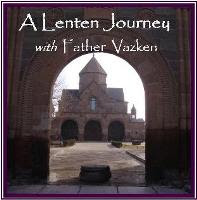Done and Go – Day 40 of 40
Armodoxy for Today: Done and Go – Day 40 of Lent
Congratulations! You made it to the end of the Lenten Journey. Forty days ago we began this trek and today it comes to an end and you transition. Your prize is waiting for you. It is life but with a new twist, you have found what is important, what is essential, in life. Not the bare minimum to survive, but the best of the pick of life, a life that is full of purpose and meaning, a life that is blessed by God and in harmony with the life around you, is now accessible to you.
At the end of his forty days in the wilderness Jesus gave three answers to the Tempter that I am sure resonate with you today. First, he said, “Man does not live by bread alone, but by every word God.” Second, “You shall worship the Lord your God, and Him only you shall serve.” And finally, “You shall not test the Lord your God.” (Luke 4)
These words are no longer the punch line to a story, but, to the person who has accomplished the Lenten Journey and exercises, these words are the foundation to life moving forward. You have discovered that Lent is not about the bare necessities of life, but the bare essentials of life. The forty days are up and ahead of you are 325 days that are to built on these teachings.
I remember one of our psychology professors mentioned the goal of therapy is to eliminate you, the therapist, from the life of the patient. The same can be said about the Lenten Journey. Lent in itself is only there to help you, to guide you, but the main event is life itself. Lent is there to get you up and running for life, just like crutches, after leg surgery, are necessary to support and hold you up, and at some point you toss them and walk on your own.
Life is ahead of you. You are prepared. You have filled your life with increased acts of charity, stronger prayer life and fasting. Don’t stop because Lent ends. Tomorrow begins Holy Week, we transition to the most sacred period of time in the life of a Christian. You are ready to greet it and live it, with Christ’s passion, trial, sentencing, crucifixion and then, most importantly, the Resurrection. The Life of Christ will have new meaning for you as Lent has heightened your senses to now, walk with Christ on the road to the Cross and greet the Empty Tomb.
Celebrate tonight with the Day 40 recipe. jicama salad, and its recipe can be found at the link below. God bless you.
We pray from the Armenian Church’s Book of Hours, Receive, Great and Almighty God, these prayers and service. Make your light of righteousness and wisdom shine forth upon us and make us sons and daughters of light and of day, so that in godliness we may lead our life and fulfil it without offence, for You are our helper and Savior and to You is fitting glory and honor. Amen.
Lenten Recipes by Deacon Varoujan: Recipe 40: Jicama Salad
Cover: Sunset over Western Armenia, 2014 Gregory Beylerian



